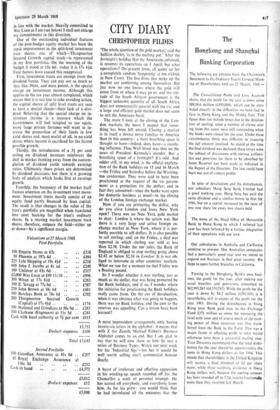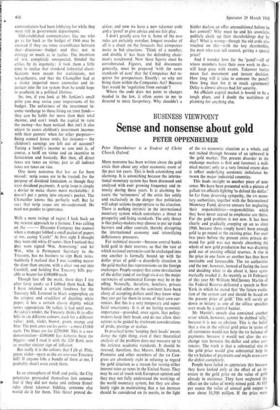CITY DIARY
CHRISTOPHER FILDES
'The whole question of the gold market,' said the bullion dealer, 'is in the melting pot.' After the fortnight's holiday that the Americans enforced, it resumes its Operations on 1 April; but what operations? On present form, all seems set for a completely random 'happening' at ten o'clock in New Court. The five firms that make up the market are conferring among themselves. But just now no one knows where the gold will come from or where it may go to; and the atti- tude of the South African government is the biggest unknown quantity of all. South Africa does not unnecessarily quarrel with the us; and a large and efficient gold market does not seem to suit the American book.
The more I look at the closing of the Lon- don markets, the more I suspect that some- thing has been left unsaid. Closing a market is in itself a device more familiar in America than in this country: a short breathing space is thought to have—indeed, does have—a steady- ing influence. Thus Wall Street was shut on the news of President Kennedy's murder. But a breathing space of a fortnight? It's odd. And odder still, to my mind, is the official explana- tion of the Bank holidays on 15 and 16 March —the Friday and Saturday before the Washing- ton conference. They were said to have been proclaimed at the request of the us govern- ment as a protection for the dollar; and in fact they amounted—since the banks were open for domestic business as usual—to the closing of the London foreign exchange market.
Now if you are protecting the dollar, why do you close London and leave New York open? There was no New York gold market to shut: London is where the action was. But there is a very large and active foreign ex- change market in New York, where it is per- fectly possible to sell dollars. It is also possible to sell sterling: and, on the Friday, a deal was reported in which sterling was sold at less than $2.38. Under the IMF rules, the Bank of England is obliged to stop sterling going above $2.42 or below $2.38 in London. It is not ob- liged to intervene in other countries' markets. What we saw for a moment on that Friday was a floating pound.
So I wonder whether it was sterling, just as much as the dollar, that was being protected by the Bank holidays; and if so, I wonder where the initiative for proclaiming the Bank holidays really came from. On the eve of devaluation, when it was obvious what was going to happen, there was no Bank holiday, and the cost to the reserves was appalling. Can a lesson have been learned?
A most improvident arrangement, only having twenty-six letters in the alphabet: it means that with Z for Zenith, Michael ffolkes's Business Alphabet comes to an end. But I am glad to say that he will now chow us how he sees a series of Business Types. Watch out next week for his 'Industrial Spy'—for her it would be well worth selling one's commercial honour dearly.
A burst of irrelevant and effective aggression in his winding-up speech rounded off for the Chancellor a week of personal triumph. He has scored off everybody, and everybody loves him. As for his press: you would think that he had introduced all the measures that the commentators had been lobbying for while they were still in government departments.
Old-established commentators like me who go as far back as the budget of 1966 may be excused if they see some resemblance between that—disastrous—budget and this; not in strategy so much as in tactics. The invention of SET, completely unexpected, blinded the critics by its ingenuity : it took them a little time to realise that standard industrial classi- fications were meant for statisticians, not tax-gatherers, and that the Chancellor had at a stroke imported more anomalies and in- justices into the tax system than he could hope to eradicate in a political lifetime.
So, too, if you look at Mr Jenkins's small print you may revise your impressions of his budget. The unfairness of the investment in- come surcharge to those living on trust funds— they can be liable for more than their total income, and can't touch the capital to raise the money—has been noticed. But isn't it also unjust to assess children's investment incomes with their parents' when for other purposes— fixing council house rents, for instance— the children's earnings are left out of account? Taxing a family's income as one unit is, of course, a tariff on virtue and an incentive to fornication and bastardy. But then, all direct faxes are taxes on virtue, just as all indirect taxes are taxes on vice.
One more nonsense that has so far been missed: scrip issues are to be treated, for the purpose of dividend limitation, as though they were dividend payments. A scrip issue is simply a device to make shares more marketable: it doesn't put a penny into anyone's pocket. The Chancellor knows this perfectly well. But he says that scrip issues are misunderstood. He need not pander to ignorance.
With a mere twinge of regret I look back on my nearest approach to a fortune. I was calling on the Discount Company (no names) when a manager lobbed a small packet of papers at me, saying 'Catch!' At first sight I thought they were old white £5 notes; then I noticed that they were signed Wm. Armstrong,' and Sir Wm., who is Permanent Secretary to the Treasury, has no business to sign Bank notes. Suddenly I realised that I was standing nearer the door than anyone, with a clear run out into Cornhill, and holding five Treasury bills pay- able to bearer for £100,000 each.
Though fast off the mark, these days I tire after forty yards; so I lobbed them back. But I have retained a certain fondness for the Treasury bill. Lettered in black copperplate on the crispest and crackliest of dazzling white paper, it has a certain classic dignity which seems appropriate. Or rather, it had until now, At today's tender, the Treasury thinks fit to offer bills in six different colours, each for a different value : pink, violet, -brown, green, orange and blue. The pink ones are les petits—a mere £5,000 each. The blues are for £250,000. This is a new denomination—£100,000 has hitherto been the biggest—and I read it with the £20 Bank note as another sinister sign of inflation.
But really it is the colours that I jib at. Pink, green, violet—spare us the art nouveau Treasury bill! If anyone lobs a bundle of these at me, I probably shan't even catch them.
In an atmosphere of bluff and panic, the City potentates persuaded themselves last summer that if they did not make and enforce firmer rules about takeover bidding, someone else would do it for them. This threat proved de- cisive; and now we have a new takeover code and a 'panel' to give advice and see fair play.
I don?t greatly care for it. Some of the new rules are certainly overdue; longest overdue of all is a check on the forecasts that companies make in bid situations. 'Think of a number, and double it' has been the defending chair- man's watchword. Now these figures must be corroborated. Figures, and bid documents generally, must be prepared 'with the same standards of care' that the Companies Act re- quires for prospectuses. Exactly : so why not bring them within the Companies Act? Because that would be 'regulation from outside'?
Where the code does not point to changes needed in the law, it often seems to me to descend to mere fusspottery. Why shouldn't a bidder declare an offer unconditional before he has control? Why must he and his associates publicly chalk up their shareholdings day by day? What is wrong—though the old code also touched on this—with the key shareholder, the man who can sell control, getting a special price?
And I wonder how far the 'panel'—all of whose members have their own work to do— will keep pace with events. Takeover tactics mean fast movement and instant decision. How long will it take to convene the panel? How long then for it to reach agreement? Delay is almost always bad for security.
An efficient capital market is bound to be a tough place, and I doubt the usefulness of planning for anything else.







































 Previous page
Previous page